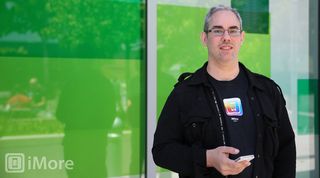Editor's desk: Google I/O, Twitter-pocalypse III, 300 + 1, and more!

It's July 1 and that means it's Canada Day here in the great white north -- or The Wall, as HBO fans would now better understand it.
Canada Day, for those unfamiliar, celebrates the 1867 signing of the British North America Act, which united Nova Scotia, New Brunswick, and Upper and Lower Canada (Ontario and Quebec). Suffice it to day, there's been barbecue and parades already, and there'll be fireworks soon, so for the second week in a row I'm going to Nickinson this and keep it brief-y.
Google I/O
Speaking of Phil, he and Jerry and Alex (and Kevin!) covered the hell out of Google I/O this week. While I have no actual proof they were the ones sky diving out of the planes with Project Glass strapped to their skulls, I do know they brought back all the news worth knowing.
I already shared my own quick take on the announcements during the day one keynote, but I'll say it again --Android 4.1 looks great. My biggest wish for Jelly Bean was for Google to slow down and fix their interface rendering and their physics, and they seem to have done just that.
I ordered a Nexus 7 and look forward to seeing if it really is the "Butter" Google claimed. (If it's "I can't believe it's not butter", someone's gonna get hurt real bad...)
I've got a longer editorial coming on the Nexus 7 tomorrow or the next day, and what it may or may not mean for Apple's rumored 7-inch iPad, so I won't say much more about it here.
I'll just leave you with this little sneak preview of Google I/O 2017...
Master your iPhone in minutes
iMore offers spot-on advice and guidance from our team of experts, with decades of Apple device experience to lean on. Learn more with iMore!

Apple has made their own operating systems. They've made their own cloud services system. They haven't made their own social system. Sure, they've done Game Center and the soon-to-be-late-and-unlementaed Ping, but when it comes to hardcore, pervasive social services they've been content to outsource it to Twitter in iOS 5 and Facebook in iOS 6.
Apple doesn't get social and now they seem to get that they don't get social. More than that, they seem to get that social itself is nowhere near as persistent as local operating systems and cloud services systems. Just ask Friendster. Or MySpace.
Apple rose, so did DOS and Windows, so did Nokia Palm and RIM, so have iOS and Android. Platforms evolve and change over time, but social is human. It's tribal. It's migratory.
And Twitter would do well to remember that.
As Twitter's userbase has transformed from technology geeks who are active, who follow and are followed by dozens or hundreds or thousands of peers, who direct message, who make apps -- who help build and shape the service they love. It's transformed into a more passive, mainstream audience that doesn't DM, doesn't have many followers, but follows hundreds of celebrities.
It's why Twitter for iPhone went from Loren Brichter's brilliant Tweetie to very differently focused new Twitter for iPhone.
That's a huge amount of pressure, and it looks like Twitter's floundering under the change, and the growth.
They're still groping their way towards a revenue model. Rather then simply offering pro accounts or including simple in-stream ads, they're moving ahead with befuddling promoted tweets and who knows what else.
And they're still confounding developers with cryptic, borderline antagonistic proclamations about what types of apps they will and won't tolerate long term. Rather than simply telling developers of alternate client apps that ads belong to Twitter and all clients have monetize through paid apps, they're dangling the API version of the sword of Damocles over their heads to chilling effect.
They're not keeping it simple, and that's a far bigger risk than alternate clients could ever be.
I wondered out-loud -- on Twitter, poetically -- how many Twitter app developers it would take to spin up their own micro-blogging platform.
To end users, the interface is the app. Changing the pipes in the back, as long as functionality and service levels remain acceptable, is always an option. A difficult, maybe even arduous option, but an option. (See iOS 6 Maps.)
Developer Brent Simmons had similar thoughts, and went into detail about how an RSS-centric alternative could be realized.
The point is, platforms may rise and fall but social is far more fluid, and far more subject to the movements of key influencers.
And Twitter would do well to remember that.
300 + 1
This week was the blockbuster 300th episode of the iMore show. If you can get through the first 5 minutes without a huge hit of nostalgia to the face than you simply haven't been listening to mobile podcasts enough. We have clips from the very first show and all the debuts since. Voices from the past include Dieter Bohn and Mike Overbo, Chad Garrett and Mickey Papillon, and lots more you truly have to see (or hear) to believe.
If you haven't already, give it a watch now. And while you're watching, don't forget to subscribe to our YouTube channel and leave a comment on the video. That'll enter you into our just-announced iOS Dream Device Giveaway, and you really don't want to miss that.
Speaking of things not to be missed, Leo Laporte and Andy Ihnatko were gracious enough to invite me to join them and Mac OS Ken on MacBreak Weekly 305.
Features
- Remember geeks, iOS wasn't made for us. A lot of the coverage we have planned for Mountain Lion and iOS 6 revolves around Apple's market, so I needed to sit down and ask myself just what that market was. I broached the topic first on our podcast, as usual, but then formed it into words and such. As Apple starts doing more and more, I think it's important to remember who they're primarily doing it for, and weighing the merits (or lack thereof) in that context.
- Google Chrome for iPhone and iPad review. Leanna takes Google's new browser for iOS out for a test drive and tries to figure out if the iOS-imposed limitations on JavaScript speed and default status are made up for by the interface and sync services. (Spoiler: how you feel about Google in general will likely be the deciding factor for you.)
- Podcasts for iPhone and iPad app review. Ally Kazmucha likewise looks at Apple's brand new podcatcher and weighs it against her previous look at Instacast, Pocketcasts, and Downcast.
- Rather than just letting developers respond, Apple should fix App Store reviews for everyone. Yours truly with some thoughts on bandaids for axe wounds.
Recommended reading
- iPad productivity apps. Developer Matt Gemmell, skewering the "iPad-isn't-for-content-creation" canard one app at a time.
- The camera you have with you. Developer Marco Arment makes the case for why the camera you have with you should sometimes be better. (I'm lugging a 5D Mark III around with me, but I still use my iPhone 4S camera as well.)
- Developers, bracing themselves for Twitter API restrictions, call today’s post “ominous”. Matthew Panzarino talks to developers about Twitters continued crazy-eye at development.
- Android devices have already been found to infringe 11 valid Apple and Microsoft patents. Florian Mueller looks at the string of thus-far-successful patent suits against Android.
- Editorial - Windows Phone getting fragged. Mateo Nunez writes in counterpoint to my rant last week about Windows Phone 8. I'd counter again, but it's more fun to simply link to Nokia's even more egregious-in-hindsight smartphone beta test videos...
- After tonight’s Q1 conference call, just how bad are things for RIM?. Chris Umiastowski once again separates the facts from FUD, and takes a look at just where RIM stands post BlackBerry 10 delay.
And now, the fireworks
Literally. They just started going off outside, so I'm outta here.

Rene Ritchie is one of the most respected Apple analysts in the business, reaching a combined audience of over 40 million readers a month. His YouTube channel, Vector, has over 90 thousand subscribers and 14 million views and his podcasts, including Debug, have been downloaded over 20 million times. He also regularly co-hosts MacBreak Weekly for the TWiT network and co-hosted CES Live! and Talk Mobile. Based in Montreal, Rene is a former director of product marketing, web developer, and graphic designer. He's authored several books and appeared on numerous television and radio segments to discuss Apple and the technology industry. When not working, he likes to cook, grapple, and spend time with his friends and family.
Most Popular





